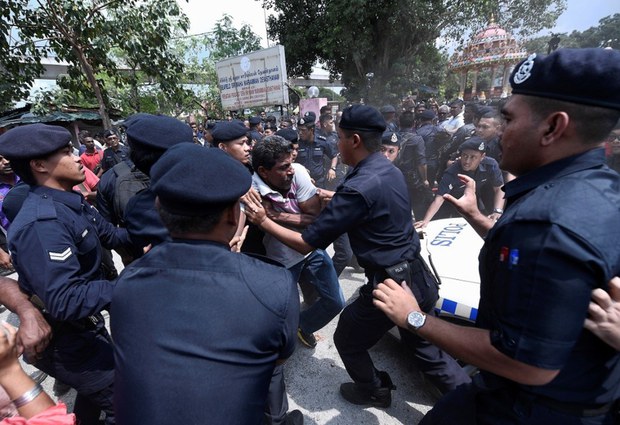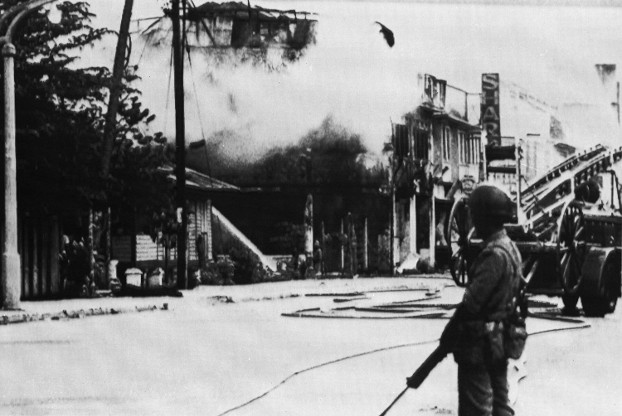50 Years after 1969 Riots, Race Relations in Malaysia Remain Uneasy
2019.08.01
Kuala Lumpur
 Malaysian police clash with protesters outside the Sri Maha Mariamman, a Hindu temple in Subang Jaya, Selangor state, Nov. 26, 2018.
Malaysian police clash with protesters outside the Sri Maha Mariamman, a Hindu temple in Subang Jaya, Selangor state, Nov. 26, 2018.
A half century after deadly race riots threatened to tear Malaysia apart, race relations remain a concern among the country’s political leaders and the newly installed king himself.
Prime Minister Mahathir Mohamad, who campaigned on a pledge to defend the rights of all Malaysians irrespective of religion or race, was propelled to power last year when his coalition, led by the multiracial party People’s Justice Party (PKR), toppled the government dominated by an ethnic Malay-based party that had ruled the country since independence in 1957.
Many had hoped that the new government would move aggressively with reforms to ease racial tensions.
But racial and religious tensions in the multiracial country may have worsened, PKR leader Anwar Ibrahim warned on the anniversary marking the first year in power of the Pakatan Harapan (PH) coalition, or Alliance of Hope.
“The threat of racist and communal flames should not be taken lightly and brushed aside, and if left unchecked could destroy all moves to put the country back on track,” he said in an anniversary message in May.
That month also marked the 50th year since bloody riots, which erupted on May 13, 1969, left nearly 200 people dead in Malaysia, many of them Chinese according to official figures, although diplomatic sources at the time said the number could be closer to 600.
Muslim Malays, along with other indigenous people, make up 69.3 percent of the country’s 32.6 million population while ethnic Chinese comprise 22.8 percent and ethnic Indians consist of 6.9 percent, according to figures provided by the Statistics Department in July.
Special privileges enshrined in Malaysia’s constitution ensure that Malays are granted business licenses, scholarships and jobs in the public sector and civil service.
Those privileges were reinforced by the New Economic Policy passed in the wake of the 1969 riots and aimed at giving Malays more access to economic opportunity as a way of reducing racial tensions.
Many of those policies remain in effect but reforms over the years have hardly eased tensions.
This week, Malaysia’s new king Sultan Abdullah Sultan Ahmad Shah alluded to potential resurgence of a racial crisis, urging Malaysians to safeguard “the people’s unity and harmony.”
“My advice is to never ‘ignite the fire’ of misunderstandings involving matters that can threaten and destroy national harmony. Playing with fire will not only end burning one self, but will also burn down an entire village,” he said as he was installed as Malaysia’s 16th monarch.
Just before the king spoke at his glittering installation ceremony at the national palace, police prevented protesters who claimed race relations between Malays and other communities have been strained from marching to the ceremony site, reports said.
The protesters were from the United Malays National Organization (UMNO), the dominant partner in the ruling coalition that was toppled from power in the last election and whose former leader who served as prime minister, Najib Razak, is facing massive corruption charges.
UMNO claims the new government has been undermining Malay privileges.
“Race relations are a bit tense. Malays are restless. We feel Islam is being treated badly (by the new government),” Lokman Adam, an UMNO supreme council member who led about 300 party members in the protest, told Agence France-Presse. “We feel the current government is not able to protect Malay rights, Islam, the Malay language and the Malay rulers.”
UMNO supporters fear that the government’s plans to officially recognize exams taken in Chinese-medium high schools will challenge the status of Malay as the country’s official language, and have also accused the government of cutting back spending on the redevelopment of mosques, AFP reported.
Teresa Kok Suh Sim, an MP from the mainly ethnic-Chinese Democratic Action Party (DAP), a PH partner, said the ruling coalition was struggling with efforts on the race question because of challenges posed by UMNO and the Malaysian Islamic Party (PAS).
“UMNO, when they became the opposition, liked to play up the race issue every now and then. Everything can be turned into a racial issue,” she told BenarNews. “On the other hand, those non-Malay and non-Muslims who voted PH put forth demands for equal opportunities, putting us in a difficult position.”
When PH came to power, it named the country’s first ever non-Malay attorney general, Tommy Thomas, and the first ethnic Chinese finance minister in more than four decades, Lim Guan Eng.
Shared Prosperity vision
Mahathir, who turned 94 in July, said he believes his government is taking the right approach to tackle race relations.
He said the key to the nation’s success was “cooperation and tolerance of people of various faiths, races and cultures that have been going on for so long.”
As part of efforts to maintain national unity, he said his government launched the Shared Prosperity Vision 2030 plan, which aims to ensure that all Malaysians reap the benefits of Malaysia’s economic success in a more just and equitable manner.
“This Shared Prosperity was developed to achieve several major objectives, that is to ensure that the income and wealth gap can be addressed,” Mahathir said this week.
Malaysia, however, has not been without inter-communal violence under Mahathir’s government. In November, 30 people were arrested following riots at a Hindu temple that injured eight. Authorities said the incident had escalated from a dispute over relocation of the temple.
The same month, Mahathir backpedaled on a campaign promise to support the International Convention on the Elimination of All Forms of Racial Discrimination (ICERD), amid a backlash from critics who expressed fears that it could undermine Malay privileges.
Meanwhile, Mahathir, whose Parti Pribumi Bersatu Malaysia (PPBM, or Malaysian United Indigenous Party) has the second least number of parliamentary seats in the ruling coalition, recently caused a stir among his coalition partners when he called on Malay-based parties to join ranks with his party, saying Malays should be united under one umbrella.
There also are concerns about a split in the multiracial PKR, which many once believed could emerge as a leading force in weaning Malaysian politics away from race and religion and help enhance national unity.
Much work needs to be done to boost inter-ethnic relations, says a Malay professor.
“Race relations in Malaysia 50 years post-May 13 is somewhat of an ‘old wine in new bottle.’ It still revolves around ethnic interest, religion and economic monopoly held by the Chinese,” Awang Azman told BenarNews.
“Recently it is being rattled further by non-Malays and ‘liberal Malays’ who are getting more brazen in their questioning of the Malay special rights,” said Awang, a professor at Universiti Malaysia. “This further widens the gap between the races.”

‘We all lost’
People who lived through the 1969 riots are also concerned about the lack of progress in building racial unity.
Three men who witnessed the riots – a Malay, a Chinese and an Indian – told BenarNews about their memories of that day.
Malay Mohsin Abdullah remembered seeing two Chinese motorcyclists killed.
“We as a nation lost. Nobody won. We all lost – Malays, Chinese, Indians – everybody,” he told BenarNews. “We lost lives, property, everything. This must never be allowed to happen again.”
Raj Kumar, an ethnic Indian, said that before the riot, students in his school mixed with all races – but afterward they stayed in their own groups and grew suspicious of the others.
The third man, Lim Lam Geok, said it was time for the country to move on.
“People who actually lived through the incident are getting fewer and fewer, I worry that soon without context, May 13 can be manipulated by people with a vested interest,” he told BenarNews.
“People are still suspicious about the other races. To me the best way forward is to forget about May 13. It is our fathers’ and grandfathers’ issue.”
He said it was time for the country to create a new milestone involving a different day in May – the day the PH coalition came to power that month in 2018.
“May 9 is our milestone, proof that we can transcend racial barriers to save our country,” he said. “These are the stories we should be telling our children about a hopeful future.
“Of course things are a mess right now, but it is a good foundation to build on and in time people will only remember the good things.”
The government seems determined to grapple with the problem.
At a press conference marking the 50th anniversary of the May 13, 1969, riots, Home Minister Muhyiddin Yassin talked about PH’s efforts to improve race relations.
“This is the new government. We have promised to the people that we will be fair, we will tackle issues squarely,” he said.
“We abhor any form of discrimination based on race, on religion. This is the stance of the present government, so to me this is more important than what has been in the past.”
Radzi Razak in Kuala Lumpur contributed to this report.








